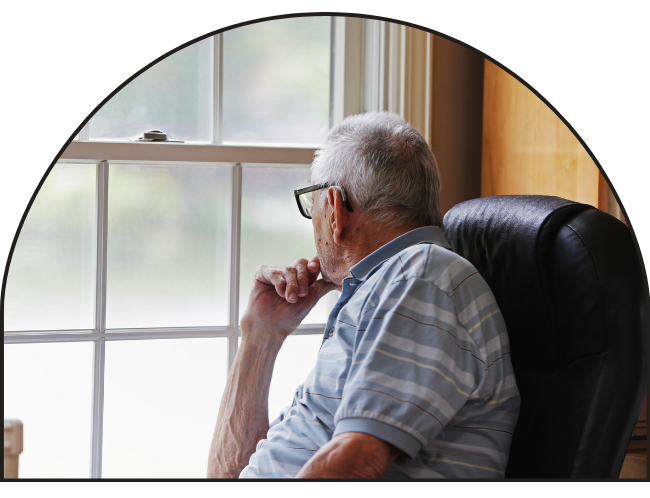
In 2023, U.S. Surgeon General Dr. Vivek Murthy declared a national loneliness and social isolation epidemic throughout the country. Loneliness and social isolation are serious issues plaguing our nation and the world, and the stigma associated with them only exacerbates the problem. As people age, they often find themselves spending more time alone, which can leave older adults particularly vulnerable to loneliness and social isolation. This vulnerability can significantly impact their health and well-being, as persistent feelings of isolation and lack of companionship can adversely affect mental, cognitive, and physical health, and thereby even affect someone’s longevity. The National Poll on Healthy Aging (NPHA) polls from 2018 to 2023 consistently found that feeling isolated, lacking companionship, and having infrequent social contact strongly correlate with worse physical and mental health outcomes among older adults.
While closely intertwined, loneliness and social isolation are two distinct concepts. Loneliness is a distressing feeling of being alone or separated, while social isolation is a lack of social contacts and having few people to interact with regularly. It’s possible to live alone without feeling lonely or socially isolated, and conversely, one can feel lonely even when surrounded by others. However, both loneliness and social isolation can lead to the health problems discussed above.
Older adults are at higher risk for social isolation and loneliness due to changes in health and social connections that accompany aging, such as age-related disabilities (physical limitations, vision/hearing/memory loss, etc.), retirement, and the loss of family and friends. The COVID-19 pandemic directly contributed to a spike in social isolation, hitting the elderly especially hard. As we transition to a post-pandemic era, these exacerbations in loneliness among older adults remain prevalent.
While there are a plethora of contributing factors to loneliness in older adults, one of the most silent is the stigma surrounding loneliness. This stigma makes it difficult for individuals to acknowledge their loneliness and seek the appropriate help they need.
Social stigma is defined as negative attitudes or beliefs towards an individual or group, resulting in devaluation or discrimination. Often grounded in stereotypes, social stigma can manifest in various ways. Society may attribute loneliness to an individual’s failure to reach out or make an effort to stay connected, implying that lonely people are somehow at fault for their situation. This negative perception can make it challenging for people to admit they are lonely and seek help, especially older adults, who may already feel marginalized due to age-related changes and societal attitudes towards aging. According to the Campaign to End Loneliness, interviews with older adults have revealed that some people internalize loneliness as a personal failing rather than recognizing it as a societal issue. This focus on individual responsibility can exacerbate the stigma, especially for seniors who, in their youth, assigned blame to others for their loneliness.
However, it’s important to distinguish between actual social stigma and perceived social stigma. Some individuals face direct instances of social stigma, such as being blamed for their loneliness. Others perceive a social stigma, fearing judgment or rejection, even if they haven’t directly experienced it. According to a study published in the National Library of Medicine, older adults interviewed expressed reluctance to discuss their feelings of loneliness to avoid rejection by friends or relatives. This perceived stigma can be just as harmful as actual stigma, preventing individuals from seeking help.
Self-stigma involves feeling shame or embarrassment about a personal characteristic or experience, leading to a tendency to conceal it from others. Perceived or actual social stigma can increase self-stigma. People may feel embarrassed or ashamed of their loneliness, blaming themselves for their situation and fearing that sharing their feelings will burden others. According to the National Development Team for Inclusion, a survey found that 76% of respondents struggled to admit their feelings of loneliness to those in their lives because they did not want to be a burden. To many people, admitting loneliness can feel like admitting failure in life’s fundamental domains: belonging, love, and attachment.
Loneliness is a community issue that requires a collective response, and we can all do our part to combat this issue. Education is key to tackling any stigma. We need to change the narrative around loneliness and encourage more open conversations. Starting discussions with friends and family, launching campaigns to educate others, and avoiding spreading stigmatizing rhetoric about loneliness (and calling it out when you see it!) can create a safe space for our elderly population to open up. One valuable resource is the Social Isolation and Loneliness Outreach Toolkit created by the National Institute on Aging, which provides ways to raise awareness about this issue. Increasing education and awareness can help reduce the stigma surrounding loneliness.
Loneliness is an epidemic that affects everyone, especially the older adults in our society. Stigma prevents people from reaching out for help, but together, we can spread education and information on this topic to help fight the stigma. By working to reduce the stigma surrounding loneliness, we can help decrease social isolation and improve the well-being of older adults. Together, let’s break the silence and make a difference in the lives of those who feel alone!
Sources
[1] Loneliness and Social Isolation Linked to Serious Health Conditions | Centers for Disease Control and Prevention
[2] Social Isolation and Loneliness Outreach Toolkit | National Institute on Aging
[3] Loneliness and Social Isolation — Tips for Staying Connected | National Institute on Aging
[4] National Poll on Healthy Aging | University of Michigan
[5] Loneliness Stigma Rapid Evidence Assessment | Gov.UK
[6] How Social Isolation Is Killing Us | NYTimes
[7] What Is Stigma In Mental Health | The Haven Detox
[8] Experienced Loneliness in Home-Based Rehabilitation: Perspectives of Older Adults With Disabilities and Their Health Care Professionals | National Library of Medicine
